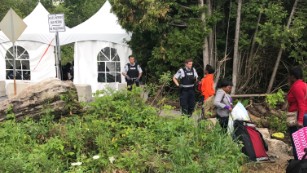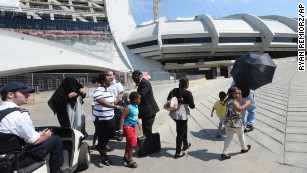Global stocks sank Wednesday after US President Donald Trump said he was not satisfied with talks that are aimed at averting a trade war with China. Equities were also dented by poor eurozone economic data, and as Trump cast doubt on a planned summit with North Korean leader Kim Jong Un. “Trump (is) continuing to drive uncertainty over global trade,” said analyst Joshua Mahony at trading firm IG. “European markets are following their Asian counterparts lower, as a pessimistic tone from Trump is compounded by downbeat economic data,” he added. Markets had surged Monday after US Treasury Secretary Steven Mnuchin and Chinese Vice Premier Liu He said they had agreed to pull back from imposing threatened tariffs on billions of dollars of goods, and continue talks on a variety of trade issues. However, Trump has declared that he was “not satisfied” with the status of the talks, fuelling worries that the world’s top two economies could still slug out an economically pain...
Waves of asylum seekers continue to cross into Canada from the United States, drawing concerns that the numbers will only rise as the weather gets warmer.
Over the last year, Canada has seen what has been called an "unprecedented" surge of asylum seekers, with more than 25,000 people intercepted by the Royal Canadian Mounted Police as they crossed from the US since January 2017 to March 2018.
And this year, the rate appears to be growing.
The number of people intercepted in the first three months of 2018 more than doubled those in the same time period last year. And in 2017, the number of people intercepted at the border escalated in the summer.
Nigerian asylum seekers arrive to Canada
Many of the asylum seekers take buses or taxis to a US border town, and walk over to the other side of the border, where they are intercepted by Canadian officials. Asylum seekers have pointed to their growing unease about the Trump administration's attitudes toward immigrants for leaving the US.
But in recent months, the cohort of who has been crossing into Canada has changed.
Many of those crossing now are Nigerian asylum seekers, who legally come to the US on a visa, stay briefly in the US and then cross the border into Canada, officials say.
"There is a small number that is abusing the US visa system. They don't have a desire to visit the United States. Their intention is to come to Canada and claim asylum," Canada's Immigration Minister Ahmed Hussen said in an interview with CNN partner CBC.
In an effort to stem those growing numbers, three Canadian officials have been stationed to work with US visa officials in Lagos, Nigeria, to prevent the abuse of US travel documents. And Hussen is scheduled to travel to Nigeria this month to meet with its officials there.
"Coming across the border in a way that seeks to circumvent our procedures is no free ticket to Canada," said Ralph Goodale, Minister of Public Safety and Emergency Preparedness, in a statement.
"We will continue to work with the United States to deter the misuse of travel documents that has helped drive the influx."
Last year, Haitians were coming to Canada
Last year, many of those coming into Canada were Haitians, who were concerned that they would lose their Temporary Protected Status or TPS, in the US, which allowed them to work and shielded them from deportation. In November, the Trump Administration announced that it would end TPS for Haitians by July 2019
In response to the arrival of Haitians, the Canadian government organized outreach in places like Miami and New York with large Haitian communities to counter social media rumors that asylum seekers would get a free pass in Canada. They translated government messages in Creole.
"I believe because of our outreach efforts into the Haitian population in the United States, this year you don't see that number," said Hussen told the CBC.
"We had one solution that worked for one population. Now we're faced with a different group of nationals," he said, regarding the Nigerians.
In response, Canadian officials are working closely with their US counterparts to make sure they're aware of the people who are abusing their visa systems, Hussen said. He said it has resulted in a 10% increase in visa refusals by the US, in recent weeks.
Most of the illegal border crossings are occurring in Quebec.
Half of Canada's 49,775 asylum claims in 2017 were made in that province. The top five birth countries of asylum seekers in Quebec are Haiti, Nigeria, the United States, India and Saudi Arabia.
Pact between US and Canada
Hussen said the government is open to possible changes to its border pact with the US, but no "formal negotiations" are happening at this stage, reported the CBC.
The pact known as the Safe Third Country Agreementbetween Canada and the United States requires people to apply for refugee protection in the first safe country they arrive in -- under which, the US is considered a safe country.
Because of this, people who seek refugee status in Canada from the US will be turned away at official border crossings. As a result, people are skipping official ports of entry and crossing over unofficially -- sometimes going through treacherous journeys to do so.




Comments
Post a Comment